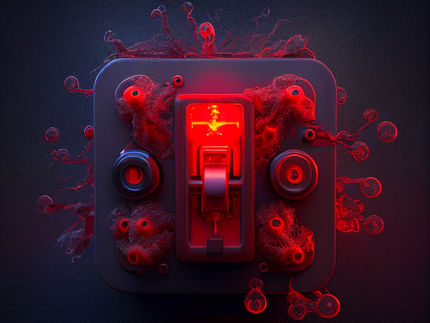"Don't eat me" signals are a survival trick for harmful T cells after stem cell transplantation
Blockade of CD47 protects against graft versus host reaction (GvHD) after allogeneic stem cell transplantation
Advertisement
An allogeneic stem cell transplant, i.e. the transplantation of stem cells from another donor, can be life-saving for patients whose own bone marrow can no longer produce healthy blood cells. However, the therapy also carries risks: Certain immune cells from the donor, known as T cells, can recognize the recipient's body as foreign and trigger an excessive immune response. This dangerous complication is known as graft-versus-host disease (GvHD).
As part of the Collaborative Research Center/Transregio SFB/TRR 221 funded by the German Research Foundation, the University Hospitals of Erlangen, Regensburg and Würzburg are jointly investigating innovative strategies for controlling the graft-versus-host (GvHD) and graft-versus-leukemia (GvL) effects. The aim is to improve the safety and efficacy of allogeneic stem cell transplantation (allogeneic hematopoietic stem cell transplantation, allo-HCT). For example, the researchers investigated why the inflammatory donor T cells that drive GvHD are not effectively removed by the immune system, more specifically by macrophages, which are also known as scavenger cells or cleansers. In doing so, the researchers uncovered a hidden survival trick of the harmful donor T cells.
T cells send a "don't eat me" signal to the immune system with CD47
The harmful donor T cells express unusually high concentrations of the protein CD47. This is a surface protein that signals to the macrophages: "Don't eat me". This overexpression was observed both in patients with GvHD and in mouse models.
"This is the first time we have clearly linked CD47 to the graft-versus-host reaction," says Dr. Haroon Shaikh from the Medical Clinic and Polyclinic II of the University Hospital of Würzburg (UKW). The immunologist from Prof. Dr. Andreas Beilhack's working group published the results in the journal Blood. He shares the first authorship with Dr. Cindy Flamann from the group of Dr. Heiko Bruns from the University Hospital Erlangen.
Blocking CD47 signaling helps to remove harmful cells, reduce inflammation and improve chances of survival
"It became exciting when we blocked CD47 with antibodies," reports Haroon Shaikh. "This is because blocking restored the macrophages' ability to phagocytose and thus eliminate the alloreactive T cells. In our mice, we observed that the harmful cells were eliminated more effectively, the inflammation in the intestine decreased and their chances of survival improved. In addition, donor T cells without CD47 caused significantly less graft-versus-host disease and led to better outcomes."
"The study shows the particular strength of our collaboration in CRC/TRR 221 GvH-GvL and its clear translational approach," emphasizes Andreas Beilhack. "Our results open up promising clinical potential for the blockade of CD47 in the treatment of GvHD," emphasizes Heiko Bruns. On this basis, the team is already preparing the first clinical trials.
Note: This article has been translated using a computer system without human intervention. LUMITOS offers these automatic translations to present a wider range of current news. Since this article has been translated with automatic translation, it is possible that it contains errors in vocabulary, syntax or grammar. The original article in German can be found here.
Original publication
Cindy Flamann, Haroon Shaikh, Carina Matos, Marina Kreutz, Hla Ali, Michael A. G. Kern, Maike Büttner-Herold, Benedikt Jacobs, Simon Völkl, Christopher Lischer, Christian Kellner, Johannes Berges, Katrin Bitterer, Domenica Saul, Manisha Goel, Cornelia S. Link-Rachner, Alma Zernecke, Daniela Weber, Dimitrios Mougiakakos, Andreas Mackensen, Andreas Beilhack, Heiko Bruns; "Augmented CD47 expression impairs alloreactive T-cell clearance after allo-HCT"; Blood, Volume 146

















































